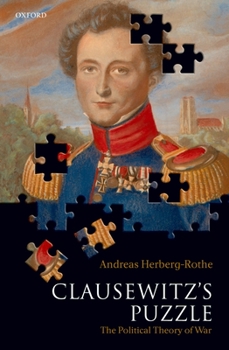Clausewitz's Puzzle: The Political Theory of War
Blending detailed contextual analysis with issues in modern-day international relations this book provides a major new analysis of the theory of Clausewitz and its relevance to contemporary society. This book argues that Clausewitz developed a wide-ranging political theory of war by reflecting on the success, the limitations, and the failure of Napoleon's method of waging war, a theory, which is still relevant in light of contemporary conflict. This new interpretation is the result of reflecting on Clausewitz's theory in light of the new developments and lays down the foundation of a general theory of war by concentrating on Clausewitz's historical analyses of war campaigns. For the first time analysis of three paradigmatic military campaigns is placed at the centre of understanding surrounding Clausewitz's 'On War'. The author argues that the limitations of Napoleon's strategy, as revealed in Russia and in his final defeat, enabled Clausewitz to develop a general theory of war.
Format:Hardcover
Language:English
ISBN:0199202699
ISBN13:9780199202690
Release Date:May 2007
Publisher:Oxford University Press, USA
Length:202 Pages
Weight:1.02 lbs.
Dimensions:0.5" x 6.1" x 9.2"
Customer Reviews
1 rating
The Best Book on Clausewitzian Theory I Have Reviewed So Far
Published by Thriftbooks.com User , 17 years ago
Dr. Andreas Herberg-Rothe's book Clausewitz's Puzzle is a book for those interested in cutting-edge strategic theory from a Clausewitzian perspective. Clausewitz's On War is a complex work because, as the author points out, it actually contains two different books at the same time: one is a Napoleonic "art of war" which is of more interest to historians, although certain aspects still apply today. The second "book" is Clausewitz's general theory of war which is the basic element of Clausewitzian strategic theory, provides the base upon which all the various theorists of this school of theory have built their applications. What complicates matters is that the two books are jumbled together as it were (although On War's Books 1, 6 and 8 contain most of the general theory). However it is Chapter 1 of Book !, What is War?, which provides the clearest explanation of the general theory as a whole. It is for that reason that Herberg-Rothe focuses on this chapter. The first section is devoted to an interesting discussion of the effects of three Napoleonic battles that Clausewitz had personally experienced and how these three very different engagements influenced his ever more complex view of unlimited war. The first was Jena-Auerstedt in 1806 which destroyed the Prussian Army inherited from Fredrick the Great and forced the defeated Prussian state to not only renounce important territorial holdings, but enter into a humiliating alliance with Napoleon. This opened for Clausewitz the way in which political changes lead to changes in how wars are fought, the mass mobilization of disciplined and dedicated citizen soldiers allowed for concentration of mass armies in place and time and led to decisive victories. Instead of allowing the troops to loot the battlefield as in earlier times, or failing to pursue due to fear of losing control of one's army, as had been the case during the wars of Fredrick the Great, Napoleon's forces were able to chase the retreating Prussians to the point where their army essentially disintegrated. Jena represents four essential ideas for Clausewitz according to Herberg-Rothe, these being war as an existential struggle, the principle of violence/destruction, orientation towards the primacy of the offensive, and military success itself can take precedence over "political" considerations, that is in effect create the political purpose through the achievement of military means. The author then does the same analysis for Moscow and Waterloo coming up with quite different and at times seemingly contradictory ideas gleaned from these two very different battles. From these various sources and complex ideas, Clausewitz began the long development of his general theory of war. Herberg-Rothe concludes that there are four fundamental antitheses in Clausewitz's general theory which were the result of his study of these three campaigns, these being: the expansion or limitation of violence (as in three tendencies to the extreme and





